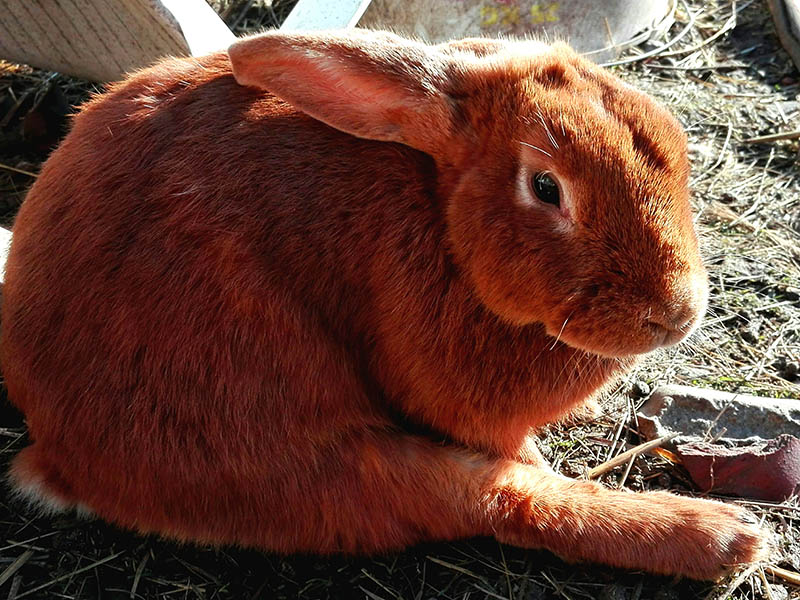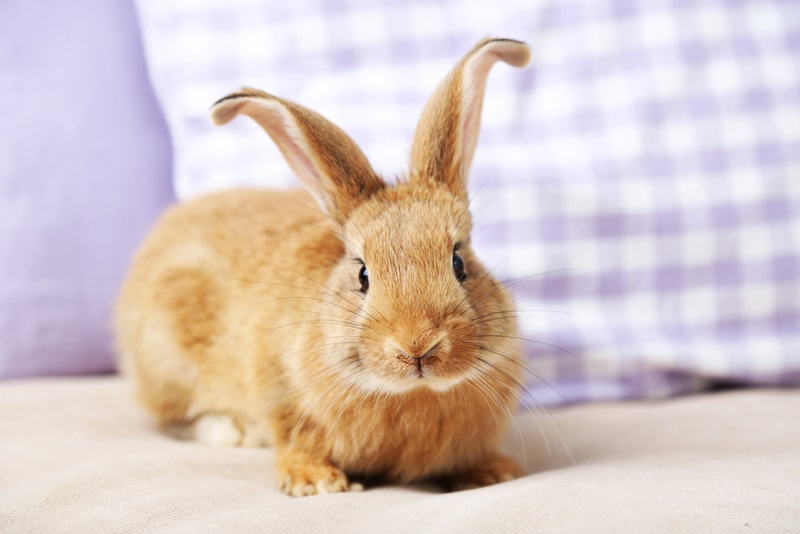Rex Rabbit: Breed Care Guide, Lifespan & Traits
By Ashley Bates
Updated on
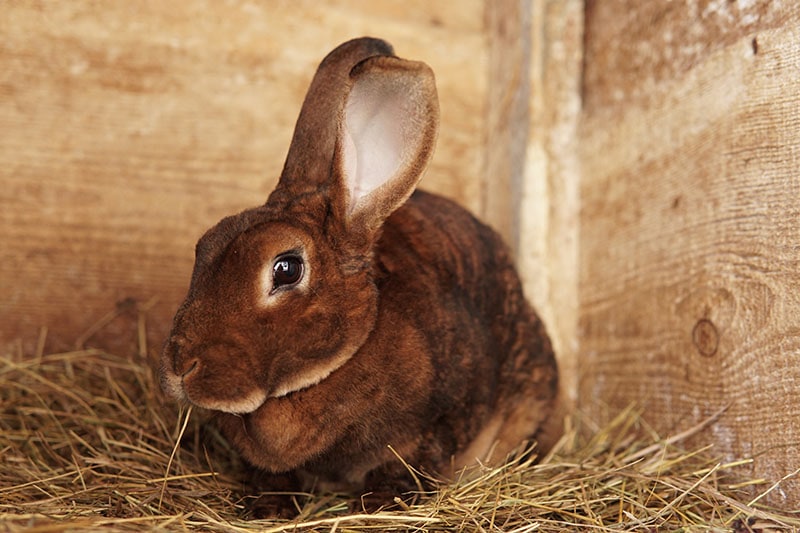
Click to Skip Ahead
There are smaller rabbit breeds by the bushel, but if you’re the kind of person who wants a full-sized rabbit, the Rex can undoubtedly be a good choice. They are a prevalent breed in pet shops and by private breeders due to their good nature and ultra-soft fur. They make quite the cuddle buddies!
| Size: | Medium |
| Weight: | 6-10 pounds |
| Lifespan: | 5-7 years |
| Similar Breeds: | Mini Rex, Plush Lop, Velveteen Lop |
| Suitable for: | Experienced rabbit owners with other rabbits |
| Temperament: | Playful, friendly, good-natured, social |
The Rex rabbit is super soft, super friendly, and super fun! Let’s learn what to expect from these bunnies and how you can give them the best life possible.
Rex Rabbit Characteristics
How Much Do These Rabbits Cost?
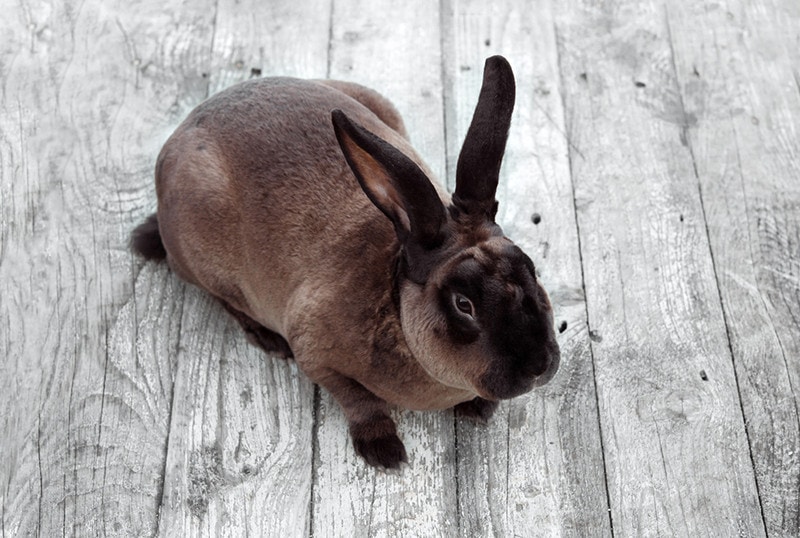
You can buy your very own plushy Rex rabbit for a total of $20 to $60. Depending on color and quality, miniature Rexes can get up to the $250 range. Standard pets are less expensive than show quality. Also, breeding rabbits will have higher pricing too.
You can find Rex rabbits at many pet shops nationwide, including major chains. However, some of these rabbits won’t be in the best health and might not have had the proper care. We recommend buying from a private breeder if you can.
Certain websites compile a list of reputable rabbit breeders in your region or state. These folks make sure that rabbit litters are healthy and structurally sound. So, just be sure to do research and choose a healthy bunny.
If you buy a Rex rabbit from a rescue or private seller, you might spend less money ultimately. Often, these rabbits come with previous vetting and their belongings. What a huge expense off your shoulders if the rabbit already comes with a cage and supplies!
Temperament & Intelligence of the Rex Rabbit
Rex rabbits are often described as being generally calm and friendly. They are very intelligent and can learn concepts if you take the time to work with them.
These rabbits tend to be very playful and enjoy the company of their same species. So, it’s never a good idea to get a solo bunny of any breed, especially not the Rex.
Because these rabbits are so calm and intelligent, you can quickly train them to use a litter box if you feel up for the challenge. That way, your rabbit can spend long periods out of the enclosure or become a house rabbit.
Remember that if you allow your rabbit to roam free all the time, they still need pleasure. It’s not a good idea to leave your rabbit out when you’re away as they can get into and chew on things they shouldn’t have.
Do These Rabbits Make Good Pets? 👪
Rex rabbits make fantastic pets for the right families. However, there might be better choices for very small children. On the one hand, you should only buy a rabbit for your child once they are responsible enough to provide care, period. This includes good handling practices.
Since the Rex rabbit gets rather large, they are unsuitable for daily handling if the child is very small. These rabbits tend to be best for children eight and older.
Does This Rabbit Get Along with Other Pets?
Rex rabbits get along swimmingly with other bunnies. They love the companionship and social nature of being around their own kind. If they are raised with cats for other pets, they might acclimate OK into the household.
However, predators should be kept from a prey animal at all costs. It doesn’t matter how calm your dog is or how well you think your cat and rabbit get along; accidents happen. Instincts are strong, so you should leave rabbits around their own species.
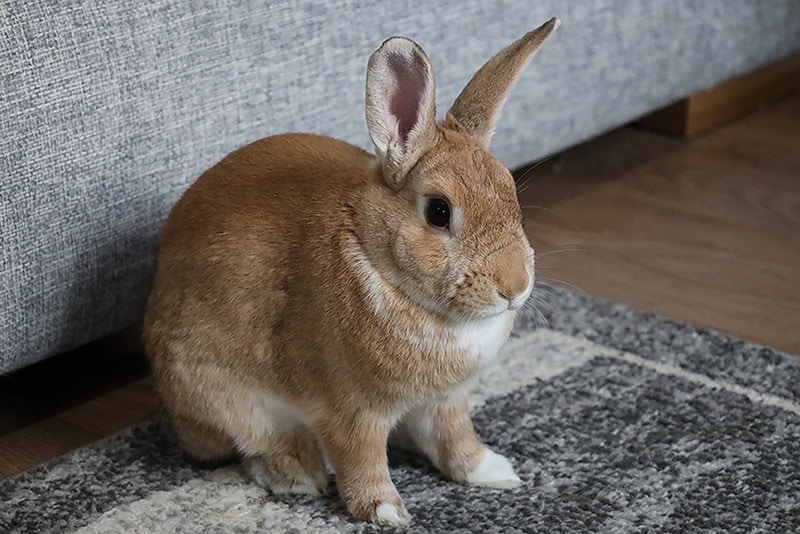
Things to Know When Owning a Rex Rabbit:
Food & Diet Requirements 🥕
Rabbits require particular diets to stay healthy. They are herbivores, meaning they eat only plant matter to stay in tip-top shape.
Your Rex rabbit should have 70% high-quality hay, such as orchard or Timothy hay. The other 30% should be leafy greens, vegetables, fruits, and grain or pellets. Be careful feeding your Rex rabbit alfalfa hay, as it is high in sugar and can lead to weight gain.
Habitat & Hutch Requirements 🏠
Getting an enclosure for your rabbits that is size sufficient is an incredibly crucial part of ownership. So, all elements need to be checked off the list—suitable cage size, proper flooring, adequate bedding, and entertainment.
Cage Size
For a full-sized adult Rex rabbit, the cage should be at least 5 feet long by 2 feet wide. Remember that you need to expand the enclosure with each rabbit you buy. So if you have more than one, accommodate accordingly.
Floor Material
A lot of rabbit hutches have wiring on the floor. While this is very common, it can also hurt your rabbit’s feet. A solid metal bottom or a plastic tray can be a much better choice. You could also cut up some scrap board or plywood to cover the floor to prevent any damage to the souls of your rabbit’s feet.
Bedding
You can choose essentially whatever bedding you would like for your rabbit, permitting you to understand the dangers of certain choices. Even though pine and cedar shavings are geared towards small pets, including rabbits, they are dangerous and can lead to major health problems for your pet.

Extras
Everyone gets bored, including your rabbit. To alleviate boredom, it’s best to have a few rabbit-friendly toys for entertainment. Also, since your rabbit’s teeth never stopped growing, they will need wooden blocks and other chew-friendly items to munch on while they’re in their enclosure.
Exercise & Sleeping Needs 🐇
You might not think much about your rabbit needing exercise, but they certainly do. Rabbits need motivation, too! Obviously, the best playtime for rabbits is when they interact with one another, but you can get in on the fun too.
The more activities you have for your rabbit, the more exercise they will naturally do. Your rabbit will benefit from chewable objects, hay to jump in, and cardboard boxes to climb in and out of. You can also get creative and take up some DIY projects for your rabbit. You can make rabbit tunnels or tubes for them to venture through.
Surprisingly, rabbits need a minimum of 4 hours per day to free run. You can split this into two intervals or create a safe space for them to run around anytime. If your rabbit is litter trained, you can allow them to free-roam the house, opening up exercise possibilities as well.
When it comes to sleeping, your rabbit’s resting area should ideally have two compartments. The first compartment should be a darkened box or area where they can escape from any noise or chaos. The other section should be a well-ventilated area where they can safely eat peacefully.
Training 🥎
If you want a house rabbit that can hop around your home, using a litter box when they need to do their business, it’s entirely possible. You can train your rabbit to do all sorts of things! But you really have to put in the work to make it happen.
Plenty of online tutorials teach you how to welcome a rabbit into the home. We want to stress the importance of having a hutch for your rabbit still. They will need a place to escape as a little sanctuary and someplace to go when you’re away from home.
Grooming ✂️
Luckily, Rex rabbits need next to no grooming. You might have to wipe over their fur with a damp cloth occasionally, but otherwise, they are pretty self-cleaning.

Lifespan and Health Conditions 🏥
Rabbits can be very finicky creatures. Your rabbit could die at just the sight of a predator or stop the perception of the threat. You want to keep them away from extremely loud noises or other environmental factors contributing to anxiety and stress. Since they are so sensitive, proper housing and common environments are absolutely essential.
Statistically, rabbits serve a much higher risk of dying early if they are kept outdoors rather than indoors. So if you do get a Rex rabbit, indoors is probably the best place where they can live a safe, happy, healthy life.
- Ear mites
- Dental issues
- Pasteurella
- Repository disease
- Urinary bladder stones
Male vs. Female
Gender is not enough to determine personality alone. Rabbits can have varying personalities depending on the end of the visual. However, there are certain characteristics and differences between male and female rabbits.
Like other animals, hormones play a very big role in territorial tendencies. It might also influence destructive tendencies like spraying, chewing things up, and aggressively digging. Both males and females have the capability of spraying, but it’s typically more common amongst intact males.
According to most rabbit experts, males are easier for first-time owners than females. That is because male rabbits are a little bit friendlier and exhibit fewer territorial tendencies. This is especially true if the rabbit has been neutered.
Overall, males are generally more laid back and relaxed, creating an opportunity for easier handling. Female rabbits are a little bit more adventurous and like being handled less. However, they can be extremely curious and playful, so they are equally terrific.
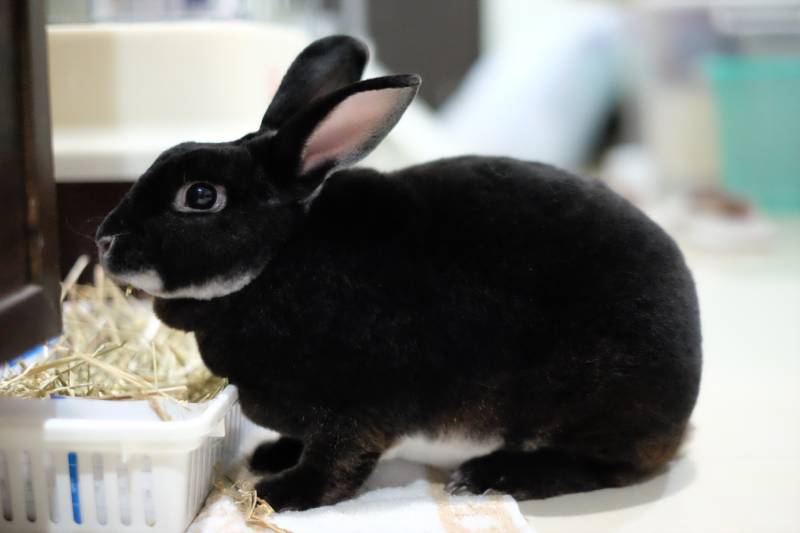
3 Little-Known Facts About Rex Rabbits
1. Rex rabbits are known as the “King of Rabbits.”
2. The Rex rabbit has a mini version.
3. Most commonly, Rex rabbits are found in North America and Europe.
Final Thoughts
Rex rabbits are pretty spectacular little creatures. They are popular pets for a good reason. These incredibly soft, amiable medium-sized rabbits acclimate well into various lifestyles. For your rabbit’s safety, it’s always best to house your bunny indoors.
This prevents them from being affected by significant temperature shifts or environmental stressors. Always make sure to do all of your research, educating yourself on the responsibility before you commit.
Related Read:
- Plush Lop Rabbit: Pictures, Care Guide, Lifespan & Traits
- Mini Rex Rabbit: Facts, Care, Diet, Pictures & More
Featured Image Credit to: Diana Sklarova, Shutterstock

